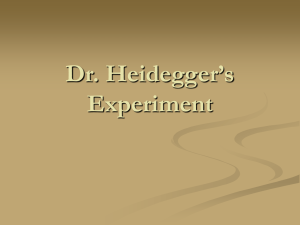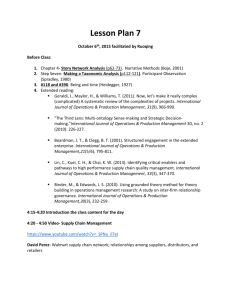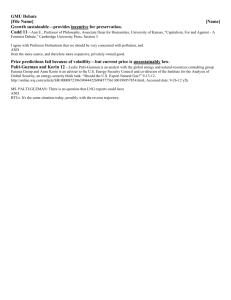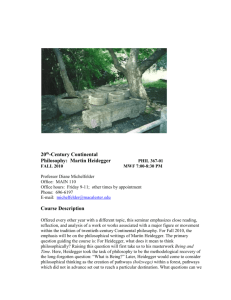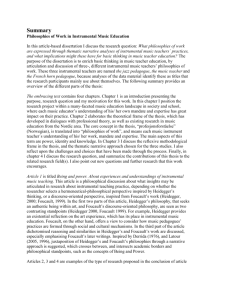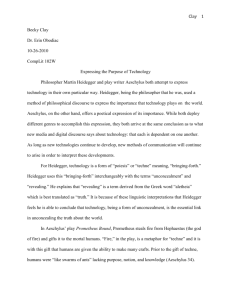Professor Miguel de Beistegui (Term I) S2.56
advertisement
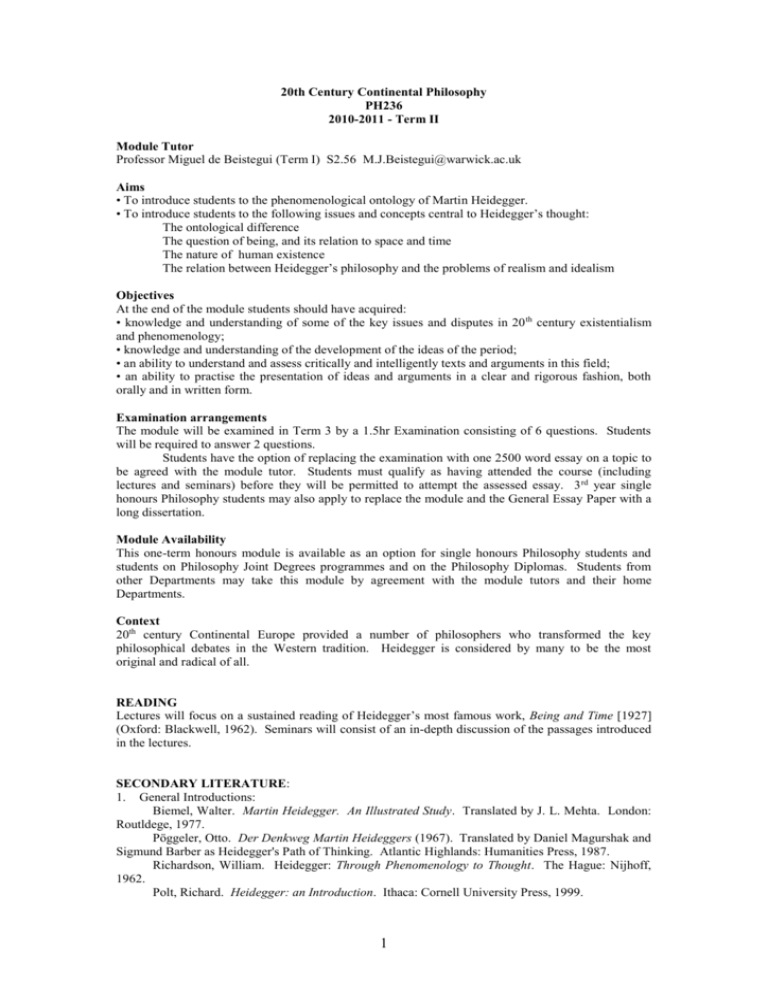
20th Century Continental Philosophy PH236 2010-2011 - Term II Module Tutor Professor Miguel de Beistegui (Term I) S2.56 M.J.Beistegui@warwick.ac.uk Aims • To introduce students to the phenomenological ontology of Martin Heidegger. • To introduce students to the following issues and concepts central to Heidegger’s thought: The ontological difference The question of being, and its relation to space and time The nature of human existence The relation between Heidegger’s philosophy and the problems of realism and idealism Objectives At the end of the module students should have acquired: • knowledge and understanding of some of the key issues and disputes in 20 th century existentialism and phenomenology; • knowledge and understanding of the development of the ideas of the period; • an ability to understand and assess critically and intelligently texts and arguments in this field; • an ability to practise the presentation of ideas and arguments in a clear and rigorous fashion, both orally and in written form. Examination arrangements The module will be examined in Term 3 by a 1.5hr Examination consisting of 6 questions. Students will be required to answer 2 questions. Students have the option of replacing the examination with one 2500 word essay on a topic to be agreed with the module tutor. Students must qualify as having attended the course (including lectures and seminars) before they will be permitted to attempt the assessed essay. 3 rd year single honours Philosophy students may also apply to replace the module and the General Essay Paper with a long dissertation. Module Availability This one-term honours module is available as an option for single honours Philosophy students and students on Philosophy Joint Degrees programmes and on the Philosophy Diplomas. Students from other Departments may take this module by agreement with the module tutors and their home Departments. Context 20th century Continental Europe provided a number of philosophers who transformed the key philosophical debates in the Western tradition. Heidegger is considered by many to be the most original and radical of all. READING Lectures will focus on a sustained reading of Heidegger’s most famous work, Being and Time [1927] (Oxford: Blackwell, 1962). Seminars will consist of an in-depth discussion of the passages introduced in the lectures. SECONDARY LITERATURE: 1. General Introductions: Biemel, Walter. Martin Heidegger. An Illustrated Study. Translated by J. L. Mehta. London: Routldege, 1977. Pöggeler, Otto. Der Denkweg Martin Heideggers (1967). Translated by Daniel Magurshak and Sigmund Barber as Heidegger's Path of Thinking. Atlantic Highlands: Humanities Press, 1987. Richardson, William. Heidegger: Through Phenomenology to Thought. The Hague: Nijhoff, 1962. Polt, Richard. Heidegger: an Introduction. Ithaca: Cornell University Press, 1999. 1 de Beistegui, Miguel. The New Heidegger. London: Continuum, 2005 ---------------. Thinking with Heidegger. Indianapolis: Indiana University Press, 2003. 2. Collection of Essays: Sheehan, Thomas, ed. Heidegger: The Man and the Thinker. Chicago: Precedent, 1981. Haar, Michel, ed. Heidegger. Paris: Les cahiers de l'Herne, 1983. Sallis, John, ed. Reading Heidegger. Bloomington and Indianapolis: Indiana University Press, 1993. Kisiel, Theodore and van Buren, John (eds.): Reading Heidegger from the Start - Essays in his Earliest Thought. Albany: SUNY Press, 1994. Macann, Christopher, ed. Critical Heidegger. London: Routledge, 1996. Raffoul, François, and Pettigrew, David, eds. Heidegger and Practical Philosophy. Albany: SUNY Press, 2002. 3. Monographs: Schürmann, Reiner. Heidegger on Being and Acting: From Principles to Anarchy. Translated by Christine-Marie Gros. Bloomington: Indiana University Press, 1987. Haar, Michel. Heidegger and the Essence of Man. Translated by Will McNeill. Albany: SUNY Press, 1993. Krell, David Farrell. Intimations of Mortality. Time, Truth and Finitude in Heidegger’s Thinking of Being. University Park: The Pennsylvania State University, 1986. Petzet, Heinrich Wiegand. Encounters and Dialogues with Martin Heidegger, 1929-1976. Trans. Parvis Emad and Kenneth Maly. Chicago: University of Chicago Press, 1993 Safranski, Rüdiger. Martin Heidegger. Between Good and Evil. Translated by Ewald Osers. Cambridge, Mass.: Harvard University Press, 1998. 4. On Being and Time: Gelven, Michael: A Commentary on Heidegger's "Being and Time" A Section by Section Interpretation. Dekalb: Northern Illinois University Press, 1989. Dreyfus, Hubert L.: Being-in-the-World. A Commentary on Heidegger's "Being and Time," Division I. Cambridge Mass. & London: The MIT Press, 1991. Kiesel, Theodore: The Genesis of Heidegger's Being and Time. Berkeley: California University Press, 1993. Mulhall, Stephen. Heidegger and Being and Time. London: Routledge, 1996. Dastur, Françoise. Heidegger and the Question of Time. Translated by François Raffoul and David Pettigrew. New Jersey: Humanities Press, 1998. Dreyfus, Hubert L., and Wrathall, Mark A. (editors). A Companion to Heidegger. Oxford: Blackwell, 2005. Part I: Early Heidegger: Themes and Influences. Part II: Being and Time. Polt, Richard (editor). Heidegger’s Being and Time. Critical Essays. Lanham, Maryland: Rowman and Littlefield, 2005. Gorner, Paul. Heidegger’s Being and Time: An Introduction. Cambridge: Cambridge University Press, 2007. Critchley, Simon, and Schürmann, Reiner. On Heidegger’s Being and Time. London: Routledge, 2008. 5. Web Sources: “Ereignis” (www.beyng.com): an extremely useful, exhaustive and up to date website, with many links to other sites, articles and books. PROGRAMME OF LECTURES AND SEMINARS: Week 1 Lecture: Heidegger’s Path Towards Being and Time Week 2 Seminar: M. Heidegger, “My Way to Phenomenology” + Being and Time, Introduction, Part One Lecture: Heidegger’s Path Towards Being and Time (cont.) Week 3 2 Seminar: Being and Time, Introduction, Part Two Lecture: Being and Time, Part One, Division One, Chapters I and II Week 4 Seminar: Being and Time, Part One, Division One, Chapters I and II Lecture: Being and Time, Part One, Division One, Chapter III Week 5 Seminar: Being and Time, Part One, Division One, Chapter III Lecture: Being and Time, Part One, Division One, Chapters IV and V Week 7 Seminar: Being and Time, Part One, Division One, Chapters IV and V Lecture: Being and Time, Part One, Division One, Chapter VI Week 8 Seminar: Being and Time, Part One, Division One, Chapter VI Lecture: Being and Time, Part One, Division Two, Chapter I Week 9 Seminar: Being and Time, Part One, Division Two, Chapter I Lecture: Being and Time, Part One, Division Two, Chapter II Week 10 Seminar: Being and Time, Part One, Division Two, Chapter II Lecture: Being and Time, Part One, Division Two, Chapter III 3
